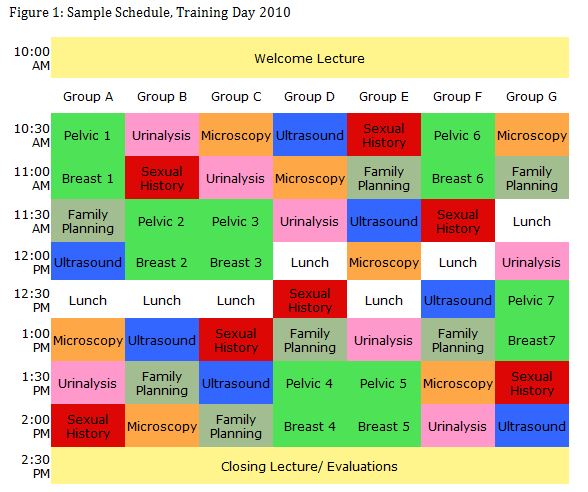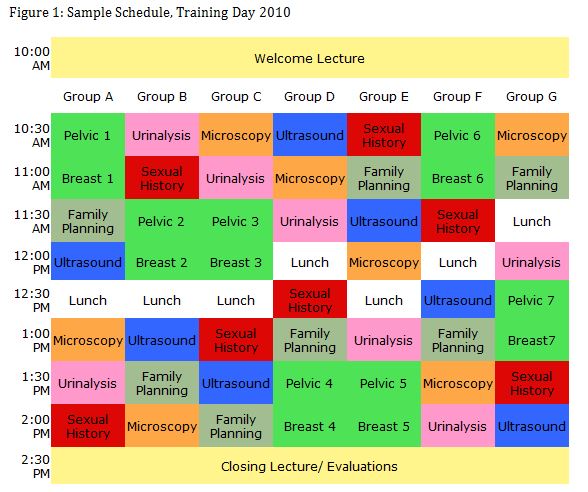Student-Developed Training Day Workshops as a Way of Promoting Women’s Health Education Early in Medical School
Ashley Rae Martinez, MD; Julia Shinnick, BA; Joelle Rosser, MD, Emory University School of Medicine
The start of medical school can be filled with anxiety for students inexperienced in patient care. Medical students involved with Emory University’s student-run women’s clinic, the Harriet Tubman Women’s Clinic (HTWC), worked to decrease this fear and foster student confidence in women’s health by developing Women’s Health Training Day (WHTD). WHTD, held each fall semester, features senior medical student-, resident-, and faculty-led workshops emphasizing women’s health, an area of medicine and volunteerism in which preclinical Emory medical students previously reported a lack of confidence. The objectives of WHTD include introducing clinical skills early in medical education and increasing student interest, confidence, and volunteerism in women’s health.
WHTD is a low-cost event funded primarily though university-wide annual student activity fees. To supplement the cost of lunch and snacks provided throughout the day, attendees are asked to provide a donation of $5. Workshop planning typically begins 2 to 3 months prior to WHTD. Classrooms in the school of medicine are reserved for each of the urinalysis, microscopy, sexual history taking, and family planning workshops. OSCE (Observed Structured Clinical Examination) suites, ultrasound machines with pelvic and abdominal probes, and plastic pelvic and breast models are reserved through the Emory Center for Experiential Learning. Volunteer faculty, residents, and senior medical students are recruited by email to lead sessions. An emergency medicine or obstetrics-gynecology faculty volunteer directly oversees the abdominal ultrasound session, where ultrasound techniques and findings are demonstrated on a volunteer in her third trimester of pregnancy recruited from the school of medicine students and their spouses. Sessions that are not able to be led by a faculty member are monitored by the clinic’s supervising physician rotating between student-led sessions to answer questions and ensure proficient teaching.
Within their first month of medical school, all incoming students are invited by email to participate in a voluntary 6-hour weekend day of workshops. Participants are randomly divided into seven groups that rotate through six distinct workshops (Figure 1).


In the ultrasound workshop, pelvic models with findings consistent with normal anatomy and an ectopic pregnancy are used to provide hands-on experience with transvaginal scanning. The pelvic and breast exam sessions consist of breast models with various benign and pathological findings and pelvic models used to practice pelvic exams. Following demonstrations, participants practice speculum techniques, Pap smears, gonorrhea/chlamydia sample collections, communication skills, and methods of breast examination, including mass detection and description.
In the urinalysis session, students learn the clinical presentations of urinary tract infections (UTIs) in women and practice urine dipstick technique and interpretation using mock urine samples. Urine samples simulate atypical findings suggestive of diabetes and UTIs. The history and pelvic exam findings accompanying sexually transmitted infections, including chlamydia, gonorrhea, and trichomoniasis, are described in the microscopy workshop through PowerPoint presentations. Participants also view previously prepared microscopy slides with normal and abnormal vaginal wet prep findings, including vaginal yeast, clue cells, and Trichomonas organisms. During the sexual history workshop, students practice culturally and emotionally sensitive history-taking skills through mock patient interviews overseen by second-year medical students. The family planning session includes a PowerPoint discussion of the efficacy, advantages, and risks of different contraceptive methods as well as samples of these devices and medications for students to see. In addition to the six core workshops, students participate in welcome and closing lectures where feedback is solicited and integrated into later training days (Figure 1).
For the last 5 years, WHTD has promoted an interest in clinical women’s health early in medical education and has remained a popular event among incoming Emory medical students. While it has been student-led since its inception, training day receives strong support from Emory faculty and administration who donate time, spaces, and resources. Barriers to further development of the event include securing continued funding and coordinating planning among a student committee that changes annually. Despite these ongoing obstacles, WHTD has broadened its workshops to include HIV testing and awareness and colposcopy basics. The expansion of training day and its corresponding student-run free clinic has incorporated physicians from multiple medical specialties, including family, internal, and emergency medicine, as well as obstetrics and gynecology, and has thus broadened students’ exposure to women’s health within a variety of medical fields early in their education.
